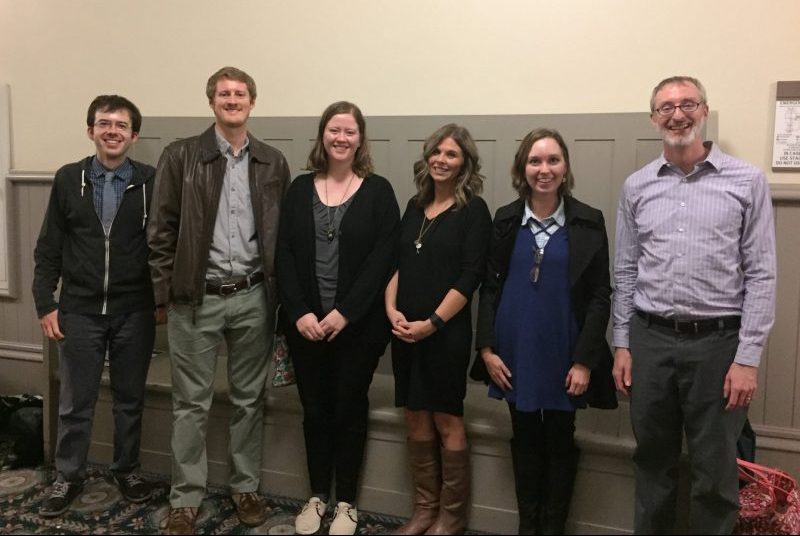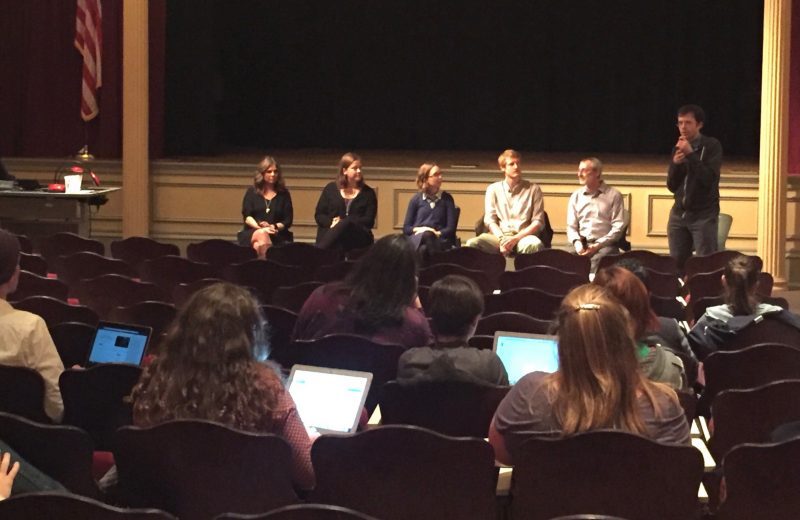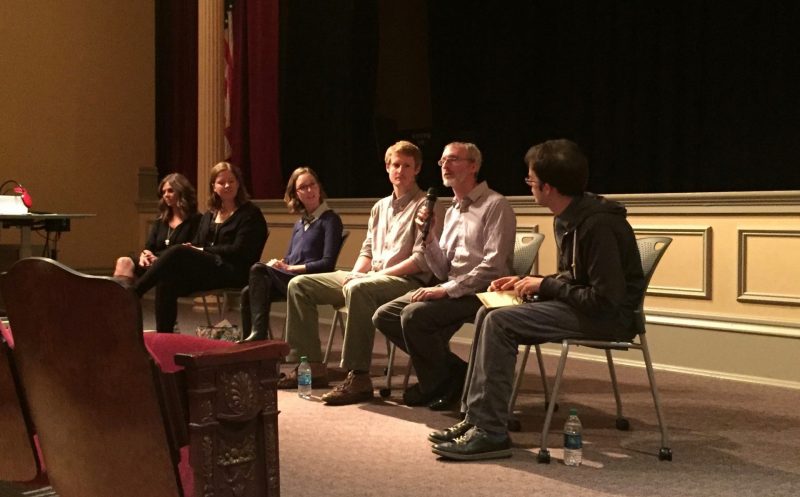M.A. Alumni Talk about Their Careers in Secondary Education

From Left to Right: John Stout, Aaron Nugent, Alicia Troby, Sara Putman, Karly Eaton, Ryan Stripling
On Monday, November 7th, a Graduate Students in English (GSE) panel made up of five of our English M.A. alumni spoke to current graduate students in our department about the panelists’ experiences as teachers in secondary education. Four of the panelists teach at area high schools (Aaron Nugent at Fayetteville, Sara Putman at Alma, Ryan Stripling at Bentonville, and Alicia Troby at Rogers), and one teaches at a local junior high school (Karly Eaton at Haas Hall). In the course of an hour, these alumni talked about their paths to becoming secondary education teachers, the unique rewards of their jobs, and also the particular challenges associated with choosing such careers. In addition to participating in the panel event, a number of these alumni agreed to send in written descriptions of what they most enjoyed about their positions, as well as what could be especially difficult about those jobs–i.e., key aspects of teaching seventh through twelfth grades that current graduate students should keep in mind before diving into the profession. Their responses are featured below. We would like to thank: the panelists for generously taking time out of their busy schedules to participate in the event and to contribute to the blog; Jason Curlin, another M.A. alum who could not attend the event but also sent in responses; and John Stout, a current M.A. student who both organized and moderated the panel event on behalf of the GSE.
What, so far, has been your biggest challenge as a teacher in secondary education?
JASON CURLIN: The challenges are many. I teach in situations of high poverty where the institutions and expectations of those around my students are for failure. Contacting parents are hard when the kids even have parents. Many of my kids had permanent subs for many of their elementary school years and now that they have come to high school they still are mostly taught by permanent subs and first-year teachers (Arkansas Teacher Corps and Teach for America teachers) who leave after two or three years.
KARLY EATON: To an introvert, teaching can be a draining–daunting, even–experience. One of the biggest challenges that I encounter is being able to bring the same level of passion and energy to every class, assignment or random question that my students ask (and seventh and eighth graders ask a LOT of questions). As a teaching assistant at the university, you might have a little time in-between classes to grab some coffee or a snack and mentally prepare for your class. Teaching in a secondary education classroom, you have to be “on” from the moment you walk in your classroom door until the moment you leave campus (and sometimes, even at home answering student messages). Fortunately, as a teacher, I also control what we do in class each day. If I need to orchestrate my lesson with independent work, then I do just that.
AARON NUGENT: One major challenge is motivating students who are in grade-level classes to care about literature. Students are faced with hunger, poverty, abuse, homelessness, and instability at home. Despite a teacher’s best effort, The Canterbury Tales might not be a struggling student’s priority on a given day. Teachers need to be compassionate and understanding with their students and passionate about their subject matter, and that same passion has to rub off on students. If students feel that you don’t know them or feel that there is no passion, excitement, or encouragement, your students will tune you out or will not buy in to your lessons.
Another complication in teaching is the constant change from one philosophical approach to another driven by district or school policy. Teachers are at the mercy of these decisions and many times have no say in the creation of policy or legislation. The best approach to overcome this is to continue to teach your content and try your best to make it fit to the new policies, which may or may not be there next year.
SARA PUTMAN: By far, the biggest challenge I have encountered is myself. After fourteen years, I still haven’t figured out the secret to work/life balance, and my personality is – probably like most English majors – introverted and reflective. When I first started teaching, I had junior high students – mostly seventh and eighth grades – and my son was in preschool. I would be completely exhausted by the end of the school day, and it was difficult for me not to come home and fall asleep. I have learned that in order to be the best I can be at my job, I have to give myself time to process the day and set aside time to meet the needs of my students. I also have to plan well so that the inevitable hustle and bustle that is my work week doesn’t catch me off guard. Now that I’ve been in the same building for almost a decade, I have a semblance of work/life balance, but I still find myself depleted by the end of the work week. I need time to recharge, and I try not to beat myself up for taking time to do that every week.
RYAN STRIPLING: Perhaps the greatest challenge for me as a secondary teacher is striking the right balance between providing insights for my students and stepping back so they can form discoveries on their own. With my English background, I love when I’m able to illuminate for my students the richness and complexity of the texts we study. However, my ultimate goal is to propel students to become lifelong learners, and I know that they are best served when they make their own discoveries. So I push myself to not just hone my understanding of the literature I teach, but also my practice of teaching—finding ways to support my students as they become more central and as I become more peripheral.

Current M.A. Student John Stout Introducing the Panelists
What, so far, has been your best experience as a teacher in secondary education?
JASON CURLIN: As an English Teacher, I am privileged enough to see the writing that my students do. When we think of English, we think of research papers, vocabulary, and reading books from old, dead, white men–people from the past whose stories have ended. We never fully think about how we are the first to see the writing of our future. We are the first to get glimpses of our talented scholars. We are the first to see the passion, the talent, the need, the art that our students have to offer. Every time I ask my students to write a paper, I am left speechless by at least one. Although I find it more difficult than I am proud to say, my students don’t enjoy having to write argumentative or research essays, but even then, I am left amazed by the talent that I read. I am given the job that will tell that student that he or she is amazing with words, with imagery, with tone, with voice. It amazes me how many of our most challenging students always find a way to leave their mark in my heart every single time I read their papers, especially when it focuses on a topic that is creative. As a secondary English teacher, I am given the chance to read people’s writing–specifically, people that are in their prime, people that have not lost their imaginations, people that have stories to tell.
KARLY EATON: I love what I do and who I work with and the students that I teach. This is the best part of teaching–getting to know your students as intelligent individuals with all of their weird quirks and goofy personalities. I love the ability of this age group to switch between critical thought and silly side-stories in an instant. When your students trust you as their teacher, it makes all of those challenging moments worthwhile.
AARON NUGENT: The best experience is when students pose insightful, academic questions about texts that are hundreds of years old, like Beowulf or The Canterbury Tales, and they make these texts relevant in their own lives. Students also bring so many different experiences to the reading of a text and can force you to view a text in a completely new way.
Teaching AP Literature has been an excellent experience as well, as these students are driven academically and on a daily basis promote thoughtful exploration of the lengthy and complicated texts we read.
Students are always creative and insightful and just need to be prompted and encouraged to create great work. I love to push students and watch them rise to the occasion on challenging assignments.
SARA PUTMAN: Another challenge I first encountered while teaching was heartbreak. High school students will not love the works of Hurston, Faulkner, Shakespeare (or whomever you have spent years studying) as much as you do. A few of them will humor you, a few will walk away with a sense of empathy or an understanding of a social issue, but a very select few will leave the text with your shared excitement. I was offended by this in the beginning of my career, but then I realized the root of the problem was the skill of reading itself. I would have high school seniors who would admit to not reading a book since fifth or sixth grade. About five years ago, this became my focus: not testing, curriculum, or technology. My students were going to leave Alma High School and – if nothing else – be readers. They didn’t have to read Thoreau, but they did need to know themselves as readers, be able to pick books that they needed when they needed it, and be assured that long books can be worth the time they put into it.
I shifted the structure of my classroom, and 3 years ago, won a classroom library from the Book Love Foundation. (Sidenote: Every English teacher must become familiar with the work of Penny Kittle, Kylene Beers, Robert Probst, and Kelly Gallagher). This allowed me to begin putting relevant, engaging books into the hands of my students. I began to give my students time to read every single day and would spend time talking to them about the books they were reading. This has been the highlight of my career. Over the course of these five years, the entire English department at Alma High School has come to adopt a similar philosophy, and we are seeing wonderful things happen on our campus. Ultimately, all of the skills we want kids to be able to do can be found by reading: critical thinking, communication, problem solving, awareness, and empathy. These are the types of citizens we want in our communities. It isn’t a magic wand, really, but then again, it kind of is. I mean, books are kind of magical, and we really have to give kids the opportunities to explore that.
My next adventure is to equip more teachers in our area with the resources they need to bring relevant books to their own students. Next fall, with the help of my friend and colleague, I will be opening an independent bookstore in Fort Smith: Bookish. We are excited to connect the members of our community with books and reading. So, in a nutshell, reading alongside kids, and staying true to my own love of books and reading, has led to lifelong relationships with students and stories.
RYAN STRIPLING: Teaching has provided me with countless “best experiences,” but one that stands out is the opportunity I had to create a literary magazine class, which I now get to teach every year. As a creative writer it’s been wonderful working with students on writing that they can more fully invest themselves in. The students involved become a close-knit family, having worked closely both as a workshop community and as collaborators on our year-long project: producing the literary magazine. To hold that tangible testament to our efforts, and to see the empowerment of young writers first seeing their names in print, has been deeply rewarding.

From Left to Right: Sara Putman, Alicia Troby, Karly Eaton, Aaron Nugent, Ryan Stripling, John Stout
